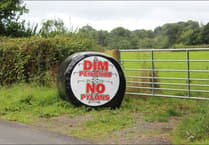“It’s the poor what gets the blame, and the rich what get the pleasure”, was a popular 19th. century music hall lyric, but its message is ageless.
It is perfectly illustrated by the 2008 financial crash, which compelled a Labour government to bail out UK banks because excessive financial deregulation in America found our own excessively deregulated banking system unable to withstand the shock from America.
Although the Conservative opposition had previously urged Labour to be even more bold in UK financial deregulation of City institutions, after the crash the Conservatives blamed Labour for being profligate in bailing out their conservative, city friends, and still do, illustrating the Tory lodestar of, “never let a good crisis go to waste”.
Thus, a crisis caused by the greed of the money markets became the excuse for austerity, transferring the burden and blame to general society. However, the greed that causes social crises is much more devastating in war, but how that greed influences war can be difficult to discern.
The media, or forth estate, is our best protection against wrongdoing, which is why fascist governments first shackle the press, and the judiciary.
The climate change protests in London this April were ignored by the media, the poor can burn provided the rich can make money.
Parliament was prorogated to avoid democratic debate, and the judges who ruled prorogation illegal were called “Enemies of the people”.
It is in the nature of government to avoid scrutiny, not only to hide mistakes but also wrongdoing, and Chelsea Manning, who released the US military and diplomatic records to Wikileaks, did so because she was appalled by what those records contained.
What she did is similar to the release of the Pentagon Papers, that revealed the deception of the American public with regards to the Vietnam war.
The US Supreme Court that upheld the Washington Post’s right to publish the Pentagon Papers was capable of recognising the importance of the freedom of the press, but currently neither the American nor British courts are sympathetic to democratic protest.
The British see what is coming down the track and they are intent upon curtailing it with the recent Law and Order Bill designed to inhibit protest, as they would also inhibit the right to strike. For this reason is Julian Assange, a journalist, being persecuted, to deter media exposure and government embarrassment.
I was astounded to recently discover that Edward VIII advised Hitler to persist with the blitz because he thought it would force Britain to negotiate peace.
The historian that narrated the documentary was equally astounded, and also found a copy of the letter sent to Hitler in the Parliamentary archives.
My first adoptive parents had their home in Portsmouth destroyed by a bomb, and although we survived, thousands perished in the blitz.
For this reason I recently travelled to Belmarsh prison, and sought the help of a passing cyclist to photograph my protest in support of Julian.
The treason of Edward is without parallel, for which he totally escaped censure, being appointed the first royal governor of the Bahamas. However, his conduct was symptomatic of a much wider sentiment, and the root cause of the Second World War, a cause routed in greed, like the financial crash.
here were many in the military, finance, industry and commerce, who shared Edwards objective of collaboration with Germany, and supported Hitler’s rise to power and his intention to attack the Soviet Union to destroy the communism that threatened capitalistic wealth.
I have previously described how reluctant, communist conscripts were suddenly demobbed just before Operation Barbarossa, which I consider to be compelling evidence in support of potential collaboration.
I will conclude by relating another story of greed, involving George Mitchell, a West countryman of humble, agricultural origin, who became a wealthy stone merchant, but never forgot his roots.
His stone was used to build St Paul’s, and he wrote a book entitled The Skeleton at the Plough, which graphically describes the abject poverty and deprivation of the agricultural workers.
Because he gave support to the fledgling agricultural union, the business community of London combined to bankrupt him, even as the government employed anti-combination law against trades unionism, notably the Tolpuddle Martyrs, and he died a pauper.
His book puts him in the ranks of journalism, and he and Julian Assange, deserve recognition for their courage.
I would ask the Cambrian News readership to add its voice for Julian’s release from the threat of extradition.




